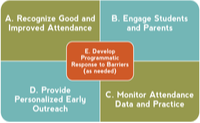Attendance Matters

Recognize good and improved attendance. Engage Students and parents. Monitor attendance data and practice. Provide personalized early outreach. Develop programmatic response to barriers (as needed)
DID YOU KNOW?
Students should miss no more than 9 days of school each year to stay engaged, successful and on track to graduation.
Absences can be a sign that a student is losing interest in school, struggling with school work, dealing with a bully or facing some other potentially serious difficulty.
Missing 10 percent, or about 18 days, of the school year can drastically affect a student’s academic success.
Students can be chronically absent even if they only miss a day or two every few weeks.
WHAT YOU CAN DO?
Make school attendance a priority
Talk about the importance of showing up to school everyday, make that the expectation.
Help your child maintain daily routines, such as finishing homework and getting a good night’s sleep.
Don’t let your child stay home unless truly sick. Complaints of headaches or stomach aches may be signs of anxiety.
Help your child stay engaged
Stay on top of academic progress and seek help from teachers or tutors if necessary. Make sure teachers know how to contact you.
Stay on top of your child’s social contacts. Peer pressure can lead to skipping school, while students without many friends can feel isolated.
Encourage meaningful afterschool activities, including sports and clubs.
Communicate with the school and Know the school’s attendance policy
Talk to teachers if you notice sudden changes in behavior. These could be tied to something going on at school.
Check on your child’s attendance to be sure absences are not piling up.
Ask for help from school officials, afterschool programs, other parents or community agencies if you're having trouble getting your child to school.
